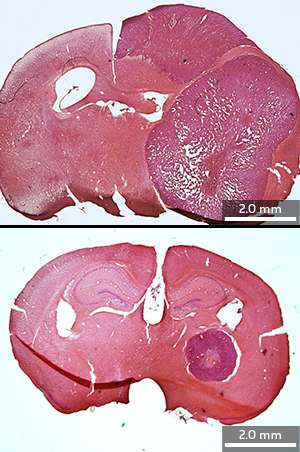Insights into an abnormally edited RNA molecule may yield new weapons against a hard-to-kill cancer

Diagnosis of the brain cancer glioblastoma multiforme (GBM) is particularly bad news for patients due to limited available medical options and poor outcomes. Even treatments that can eliminate other malignancies, such as chemotherapy and surgery, buy only limited time for GBM patients.
"The disease usually recurs due to extensive invasion of tumor cells into the normal brain tissue and therapeutic resistance," explains Shu Wang of the A*STAR Institute of Bioengineering and Nanotechnology in Singapore. "This cancer's highly lethal nature results in a median survival time of around a year for patients with advanced GBM." As scientists hunt for effective treatments, research from Wang and colleagues could offer a useful strategy for fighting this deadly disease.
Rather than producing protein-coding messenger RNAs (mRNAs), some genes encode short 'microRNAs' that regulate other genes by binding target sequences on the mRNAs that they produce. Some microRNAs undergo further enzymatic 'editing', in which certain adenine nucleotides are changed to inosine, and this 'A-to-I' modification can markedly alter a microRNA's target preference. Since previous studies have indicated a link between abnormal mRNA editing and brain cancer, Wang and co-workers investigated a group of mRNA-encoding genes known as the miR-376 cluster.
One product of this cluster, miR-376a*, typically undergoes A-to-I editing in healthy brain tissue. By analyzing primary tumor tissue as well as glioma-derived cell lines, the researchers determined that many GBM cells instead tend to carry the unedited form of miR-376a*. Importantly, a comparative analysis of patient tumors indicated that excessive levels of unedited miR-376a* are associated with considerably greater tumor volume (see image).
Follow-up studies by the team supported this connection. Relatively non-invasive glioma-derived cells became far more aggressive in culture when forced to express RNAs that mimic unedited miR-376a*; when transplanted into mice, these cells formed large, irregular tumors that soon killed their hosts. By comparison, cells expressing edited miR-376a* were comparatively quiescent, with limited tumor growth. Wang and co-workers also determined that unedited miR-376a* alters expression of a distinct subset of genes relative to its edited counterpart, some of which appear to contribute directly to its harmful effects.
"Introduction of a single base difference by adenosine-to-inosine 'mutation' in miR-376a* affects the selection of its target genes and redirects its function from inhibiting to promoting glioma cell invasion," says Wang. He adds that these results also highlight forced expression of edited miR-376a* as a possible GBM treatment strategy. He and his team are now exploring different delivery mechanisms for such a therapeutic intervention.
More information: Choudhury, Y. et al. Attenuated adenosine-to-inosine editing of microRNA-376a* promotes invasiveness of glioblastoma cells. The Journal of Clinical Investigation 122, 4059–4076 (2012). www.jci.org/articles/view/62925















